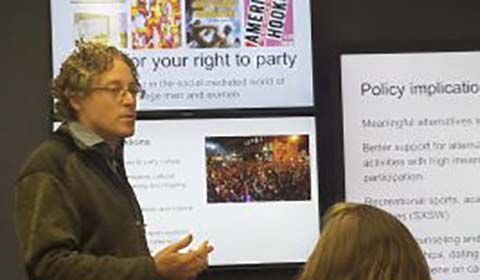By Richard Morris
Associate Professor of Sociology Dr. Ted Welser presented during an installment of the Scripps College of Communication SMART Dialogue Series, which is dedicated to providing a platform for discourse on social media research.
In his lecture, “Swipe for Your Right to Party,” he described the effects which social media has had on binge drinking on college campuses. His conclusions were based on a study conducted by himself and two Ohio University colleagues, Dr. Thomas Vander Ven and graduate student Brenna Helm.
The study was essentially rooted in the idea that interconnectivity among college students through social media leads to increased pressures to take part in campus party culture. Students are more likely to engage in heavy drinking because they are regularly exposed to it through the internet. In addition, hookup apps such as Tinder play a role in encouraging binge drinking activities, as the majority of dates through such sites involve alcohol consumption.
The possibility of reaching internet fame through reckless drunken acts captured on camera also plays a role in encouraging binge drinking. This is especially true among masculine culture, which was a heavy focus of Welser’s study. Young men are far more inclined than women to act dangerously in order to gratify their reputation of manhood.
Furthermore, the study found an interesting link between a father’s political views and a son’s tendency toward binge drinking. The son of a conservative father may be looking to fulfill the model of traditional, physically dominant masculinity; the son of a liberal father, on the other hand, may look to validate his social status on a predominantly liberal campus by partaking in its party culture.
In the study’s conclusion, Welser and his colleagues admit that binge drinking cannot be altogether erased from college campuses. Their inquiry also suggests that the act can generate “strong emotional and social benefits for some participants.” In order to reduce its most adverse effects, the three suggest that engagement in more productive activities should be encouraged. They propose the creation of structured programs within the community that, contrary to the current set of disorganized campus events, might lead to the development of a healthier and more meaningful social culture.
Although Welser, Vander Ven, and Helm have concluded their initial look into the effects of binge drinking in the social media age, they have plans to extend their research into the future. Future studies will look to incorporate data from a wider array of campuses than just Ohio University, as well as seek out a more comprehensive look at the causes and effects of binge drinking among women.




















Comments